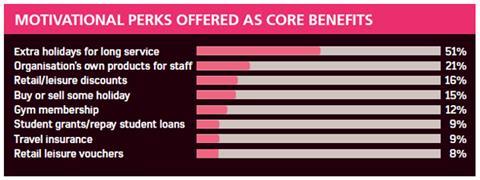
The summer season is a great time to promote activities and incentives to help boost employee engagement.
Employers looking to build a seasonal programme should first consider how all reward and benefits schemes work together in the organisation to achieve an overall purpose, for example staff motivation.
Paul Bartlett, divisional director for employee solutions at Grass Roots, says: “If an employer is seeking to build overall engagement by utilising a motivation programme over the summer period, it is important to consider whether there is alignment across all its programmes. An example might be a consistent theme across recognition, reward and the benefits on offer.”
Target audience
Establishing the staff audience is a key consideration when creating a motivation programme, especially a seasonal version, to ensure the schemes that will be promoted will reach the right demographic of employee and achieve the desired results.
Colin Hodgson, sales director, incentives and motivation, at Edenred, says: “Establish who the audience will be, what part of the team it’s for: is it customer service staff or sales teams? Then determine the objectives for the period. Employers should be clear on the objectives and set overall targets to be achieved by the incentive programme. These should include relevant and engaging rewards and prizes, which offer employees choice.”
Offering choice
There is a growing trend among employers to provide staff with choice and flexibility in a motivation programme.
Andrew Johnson, director general of the UK Gift Card and Voucher Association, says: “Gift cards and vouchers are a real premium reward for employees. Vouchers can vary in form and there is a whole range of offerings, such as Marks and Spencer, Next, Thomas Cook and Red Letter Days.
“A motivation voucher can offer staff a handful of summer-related options with a variety of choice. Spa days, leisure activities and store gift cards are popular choices.”
Travel incentives
Other perks to consider for a summer motivation programme could include travel insurance for staff looking to go on holiday abroad, awaydays and experience days. Creating a programme around seasons or themes throughout the year can help to get staff interested.
Edenred’s Hogdson adds: “Summer is a time to be outdoors, so leisure and family-oriented rewards and prizes relate better than hampers. Holidays continue to be the most aspirational reward and are an excellent way of rewarding and motivating.
“Employers could consider a theme for the motivation programme and whether rewards or prices could be aligned to the theme. For example, this year we have the Fifa World Cup taking place, so there’s lots of inspiration for structure, communication and rewards.”
Health and wellbeing
For overall staff wellbeing at work, the warmer weather brings a spike in demand for bicycles as staff take advantage of the longer days and make an effort to keep fit, but these benefits should be available all year, says Grass Roots’ Bartlett.
“Childcare vouchers and bikes are very popular, particularly over the summer months, and it is good for employees if these are available throughout the year, not just for a limited period over a flex enrolment window,” he says.
But Phil Sproston, sales director at Sodexo Benefits and Reward Services, says a motivation scheme should not focus only on offering staff rewards. “Any employer offering a motivation scheme should do it to boost engagement and motivate staff,” he says. “If organisations only reward employees annually, be it in the summer or winter, it becomes a given and staff expect it.
“Employers need to do a lot of thanking and employee recognition alongside these programmes, then it maintains a perceived value.”
A summer motivation programme can improve overall employee engagement. Bartlett adds: “Summer motivation programmes, if done well, link the opportunity to communicate with employees with something that is relevant and timely to them.”

Sample: All respondents responsible for compensation and benefits in their organisation
Source: Employee Benefits’ Benefits Research, May 2013











